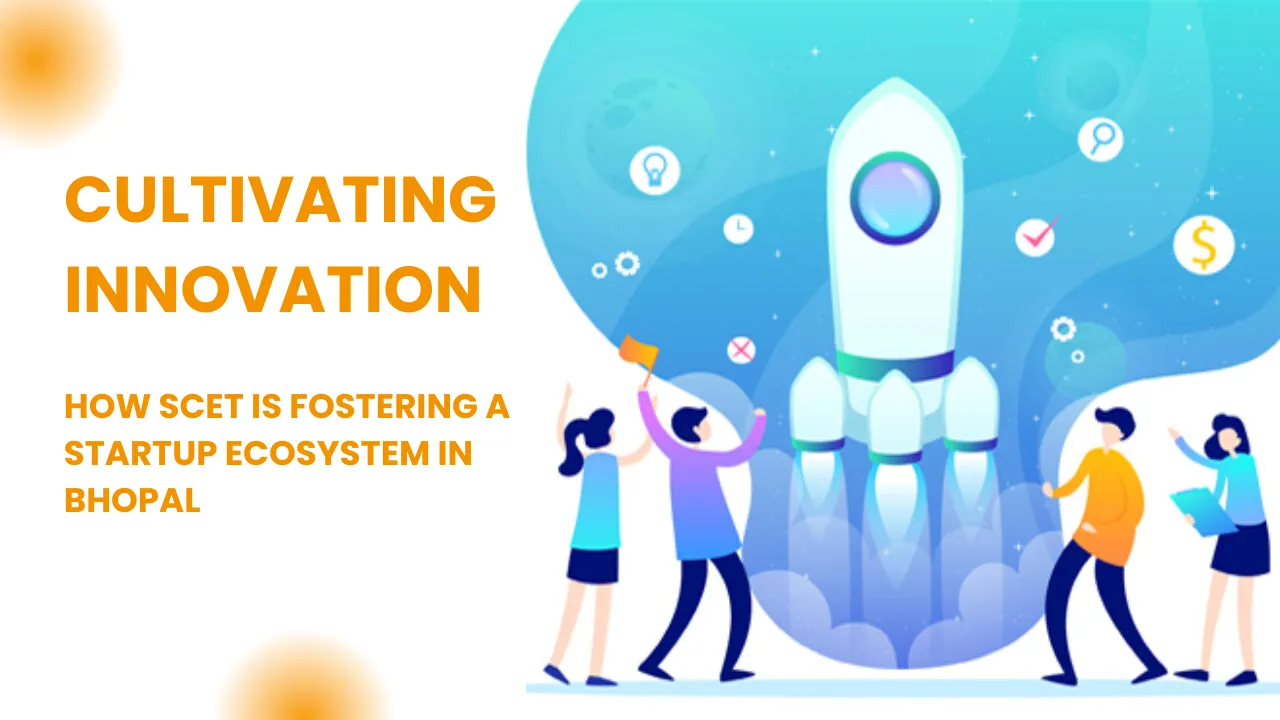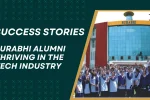Cultivating Innovation: How SCET is Fostering a Startup Ecosystem in Bhopal: Engineering colleges today have a broader responsibility than ever before—not just to teach students but to inspire creators and future leaders. In Bhopal’s growing educational landscape, Surabhi College of Engineering & Technology (SCET) is doing more than imparting academic knowledge. It’s cultivating a mindset that embraces entrepreneurship, encourages risk-taking, and rewards creativity.
Cultivating Innovation: How SCET is Fostering a Startup Ecosystem in Bhopal is more than an educational mission; it’s a movement. SCET is equipping students with the tools, mentorship, and infrastructure needed to build real-world solutions—and even launch their own startups. Through a blend of technical support, idea validation, and exposure to industry trends, SCET is empowering its students to be not just engineers but innovators.
Cultivating Innovation: How SCET is Fostering a Startup Ecosystem in Bhopal Overview
| Key Component | Purpose |
| Entrepreneurship Development Cell (EDC) | Inspires and mentors students to convert ideas into viable startups |
| Innovation Lab | Provides tech tools, co-working spaces, and hands-on prototyping resources |
| Hackathons & Competitions | Encourages fast-paced, creative problem-solving and exposure to real challenges |
| Workshops & Expert Talks | Enhances knowledge in business planning, marketing, legal, and funding strategies |
| Culture of Risk-Taking | Promotes a supportive mindset for learning from failure and embracing entrepreneurial risks |
The Vision: Empowering Engineers as Innovators
SCET believes that the future engineer is not just a technical expert but also a job creator. The college has embedded the entrepreneurial mindset into its academic culture, urging students to think beyond grades and aim for innovation. It encourages learners to spot real-life challenges and design tech-driven solutions—paving the way for transformative student ventures.
This philosophy stems from SCET’s larger vision: to become a hub for engineering innovation and contribute to the development of the Bhopal startup ecosystem. The approach is comprehensive, blending academic structure with freedom to explore new ideas.
Entrepreneurship Development Cell (EDC): The Launchpad
At the heart of SCET’s innovation efforts is the Entrepreneurship Development Cell (EDC). This dedicated hub acts as a springboard for aspiring entrepreneurs.
- Awareness Programs: Regular camps introduce students to entrepreneurship fundamentals.
- Idea Pitching Platforms: Students present and refine startup ideas through structured sessions.
- Workshops: Topics like digital marketing, IP rights, business planning, and startup funding are explored in practical detail.
- Expert Mentorship: Industry professionals and alumni offer real-world guidance and exposure.
- Networking: Events connect students with investors, government funding bodies, and entrepreneurship promotion agencies.
These initiatives ensure students receive not just encouragement but concrete steps and structured support in building their ideas.
Innovation Lab: From Concept to Prototype
Great ideas need great infrastructure—and SCET delivers through its Innovation Lab. This lab is designed to be a creative zone where students from all departments can experiment, prototype, and collaborate.
- Tech Resources: Equipped with 3D printers, IoT development kits, and simulation tools, the lab offers hands-on access to advanced technology.
- Co-working Environment: Collaborative workspaces foster team innovation and creativity.
- Faculty & Alumni Support: Students receive ongoing technical and strategic mentorship.
By translating ideas into tangible products, the Innovation Lab plays a critical role in bridging the gap between imagination and execution.
Hackathons: Testing Ideas Under Pressure
Nothing builds skill and confidence like competition. SCET encourages students to participate in various hackathons and innovation challenges—both on campus and nationwide.
- Smart India Hackathon Participation: SCET students have made a mark in national events, building solutions for real-life problems under pressure.
- Departmental Hackathons: Civil and Mechanical departments host field-specific innovation contests to drive niche-focused thinking.
These events sharpen critical thinking, test resilience, and often lead to project ideas that evolve into full-fledged ventures.
Workshops & Real-World Exposure
To prepare students for the realities of running a startup, SCET hosts a variety of practical workshops and seminars. Key topics include:
- “How to Plan a Startup”
- “Legal and Ethical Compliance”
- “Financial Assistance through MSME Schemes”
- “Digital Marketing Strategies”
- “Understanding IP and Patent Filing”
These sessions offer not just information but application-based insights, giving students the tools to pitch, launch, and grow their own ventures confidently.
A Culture That Encourages Risk-Taking
Beyond labs and lectures, what truly defines SCET’s impact is its culture of problem-solving and resilience. Students are urged to tackle real societal issues—like urban waste, rural connectivity, or sustainability—and use tech-based solutions to solve them.
More importantly, the campus encourages failing early, learning fast, and improving consistently. This mindset is critical to entrepreneurial success. It builds emotional strength, practical insight, and the courage to stand by one’s ideas even during setbacks.
Growing Impact and Future Outlook
While full-fledged startup launches from SCET are still emerging, the ecosystem is already robust. From ideation contests to competitive hackathons and expert-guided workshops, the groundwork for long-term entrepreneurial success is in place.
As students continue to gain exposure and SCET enhances its resources, it’s only a matter of time before breakthrough innovations emerge directly from the campus. Bhopal’s tech ecosystem is young but growing fast—and SCET is positioning itself as a launchpad for future leaders and innovators.
Why SCET’s Startup Ecosystem Works
- Integrated Learning: Entrepreneurship is woven into academic life, not treated as an afterthought.
- Student-Led Growth: Peer-driven innovation and self-led exploration are encouraged.
- Resource-Rich Campus: Access to labs, tech tools, mentors, and real use cases.
- Risk-Friendly Environment: Failures are seen as learning, not roadblocks.
- Industry Collaboration: Students connect directly with professionals and funding agencies.
Final Thought
Cultivating Innovation: How SCET is Fostering a Startup Ecosystem in Bhopal isn’t just a headline—it’s a reality unfolding every day on campus. By giving students the freedom to dream and the tools to build, SCET is preparing a new generation of engineers who are also entrepreneurs.
Whether you’re a student with a game-changing idea, a mentor looking to contribute, or a recruiter scouting young talent—SCET is the place to watch.
Have a startup idea or want to join a dynamic innovation hub? Comment below, connect with the EDC at SCET, or explore our blog for more stories on student entrepreneurship, innovation tips, and startup trends. The future starts with an idea—start yours today.






